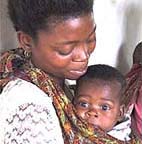|
||||

|
|
|||
|
Terms of Reference Financing Task Force As adopted at the GAVI Meeting of the Proto-Board Seattle, Washington 12-13 July 1999 Background Over the last year the key issues confronting a re-vitalized vaccine and immunization initiative were identified through a broad consultation. It is expected that this will lead to the launch of a new global partnership in the fall of 1999. The objective of the new coalition is to reduce vaccine preventable disease by making new vaccines of public health importance available to all, and the specific goals are:
The key issues include the need to address financing, strengthen advocacy for immunizations, strengthen co-ordination at the country level and strengthen research and development for priority vaccines in developing countries. Three Task Forces have been established on advocacy, global financing and country level co-ordination and a Task Force on R&D is being reviewed. The Task Force on Financing will be responsible for increasing the understanding of why there is inadequate funding for vaccines and immunisation in the poorest countries and identifying and assessing strategies which will improve the capacity of countries, donors and development Banks to finance the improvement and expansion of national immunisation programs. The task force will also identify and assess strategies for stimulating research development required for the production of new vaccines especially targeted for use in the developing world. Addressing the financing gap requires the involvement of all the partners in immunization including ministries of finance, ministries of health, Bilaterals, industry, WHO, UNICEF, NGOs such as the Gates CVP or Rockefeller, and development Banks. Financing of immunization varies tremendously from country to country. Some governments are financing all of the national needs and give a very high priority in the budget to vaccine and immunization needs. Other countries rely heavily on donors even when there is no promise of long-term support. The importance of external financing varies widely depending on the country’s relative and absolute capacity to finance their needs, particularly the introduction of new vaccines. Addressing the financing gap will likely be a combination of the following:
Task Force membership USAID – co-leader Process The Task Force members, with the World Bank and USAID co-leading, will be responsible for developing a global agenda and a workplan to address the question posed to the Task Force. The Task Force will ensure the priority activities outlined in the Agenda are addressed through the partner agencies. The Task Force will monitor progress against the Agenda and will periodically review and revise the Agenda. The Bank and USAID, with other partners will identify a coordinator to manage the Task Force, share information, organize meetings, and do research and analysis as requested by the Task Force. The Task Force is expected to meet roughly four times per year. Core members will be requested to attend all Task Force meetings and specialists will be invited to participate in meetings addressing specific topics. The Task Force is expected to be in existence for a limited duration and will review its role and terms of reference in one year’s time. Support for the Task Force will be provided by the Secretariat. Outcomes/outputs Short term In preparation for the proposed launch of the Global Coalition, the Financing Task Force will prepare an estimate of the costs of each of the quantified milestones. It is still unclear the role of the Task Force vis-à-vis the development of the Vaccine Fund. Long term The Task Force is responsible for identifying, analyzing and providing recommendations on financing policy issues and for identifying and potentially filling information needs in the financing and economic domain. The Task Force will periodically review the range of financing issues which need to be addressed and, through a prioritization exercise, develop the Task Force’s workplan for the coming 1-2 years. The preliminary list of issues which the Task Force should address include: Increase affordability and availability of vaccines
Increase National Investments in immunization programs
Optimization of external investments
Areas which are NOT the responsibility of the Task Force Fund Raising (a collective responsibility)
|
|||
| Contact GAVI | Guestbook | Text version | Credits and Copyright | |||
